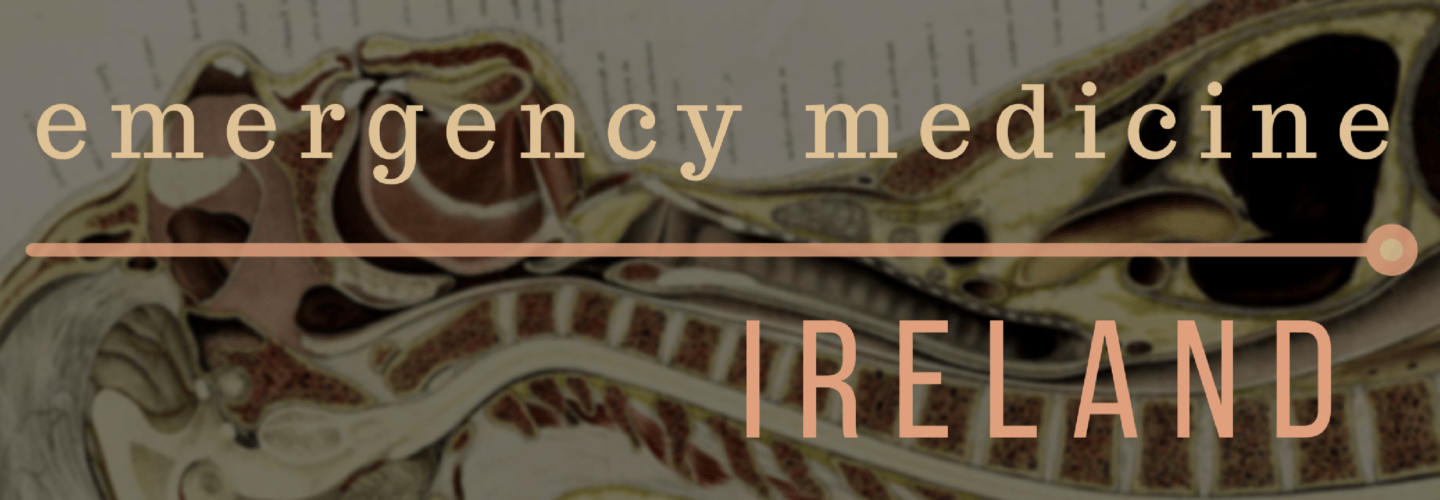This blog helps me vent a bit. That probably comes across I know.
I have at times talked fairly critically about the state of EM in the UK/Ireland and I definitely think we have some serious issues that will take a long time getting sorted.
But this is largely because this is my context. If I worked in the US then I’d be bitching about the evils of privatised health care, if I worked in NZ/Aus then I’d be…well… disappointed in the quality of the locally brewed Guinness…
This doesn’t mean that we spend all our time doing a bad job here. Or at least that we do any more of a bad job than anyone else. Patients don’t really care who is intubating them or fixing their nose bleed and so a lot of this is an internal discussion to the profession.
Having said all that I still want to have another bit of a moan.
Northern Ireland has a historically bad setup when it comes to hospital care.
Our two largest hospitals are within 10 minutes walk of each other and both on the south side of Belfast.
The hospital where I work is in the wrong place to cover the population we have. It should be in Dungannon or Armagh or somewhere a bit further west.
West of the Bann seems particularly poorly served. The problems anticipated in the run-down of services in the Mid-Ulster highlight this. @lizzyferret has written some on this
And while we have a “rural” population in UK terms it’s really nonsense when we compare it to places like rural australia (check out the awesome Broome Docs blog to see what a true generalist really looks like)
An ideal solution might be rub it all out and start again. I suggest making a new island in the middle of lough neagh and connect it to each of the adjacent counties by motorway spreading out like spokes in a wheel
I can’t see this happening any time soon.
So there has been a move in recent years to centralise services. As twitchy as it makes me feel not to have things like vascular on site, it seems necessary to centralise this type of thing as much as possible.
For the ED firstly – the knock on effect of this will be reduced support from the specialties
The second thing is EWTD – the slightly bizarre idea that it is illegal to work more than 48 hrs in a week. There are lots of reasons why doctors working 60 hrs a week may be bad, (thought that’s not as problematic as 100 hrs a week or 60 hrs a week of constant intense activity) but a blanket ban seems like a very poorly thought out idea. The chronolgical gymnastics needed to have a rota that fits has not done much for working conditions for most, never mind for patient care.
Either way it has further diminished speciality support for us in the ED, things like ENT are more likely to be on-call off site than just upstairs.
The reduced speciality support is not what I’m here to rant about. I think that that’s actually a good idea on the whole.
This may sound odd but I only started cauterising my own noses (I should have thought of a better way to phrase that…) in the past couple of years. They used to all get shipped up to ENT to clear the cubicles for yet more new patients with the dubious reason that the ENT trainees needed the practice.
You see centralising services and having less immediate support on-site is entirely appropriate to the scope of the ED and the docs working there.
The deficiencies in both our training and the system (remember it’s not just as simple as not knowing how, it’s also that we don’t have the time or resources or space to do it) are exposed as the specialties retreat off site and to the big city. This doesn’t have to be a problem, instead we can see it as an opportunity to get our shit together.
I found this video via @cliffreid which shows Dr Kas outlining the appropriate scope of our practice. (I love the way he shuts the door before he starts!)
[youtube http://www.youtube.com/watch?v=dsnTgqzao48?rel=0&w=425&h=349]


Yes… Interesting video. It would certainly be nice if this was actually what was expected of ED drs. It’s not the current set up in this country though where the ED would be very very quiet if resuscitation was the only thing done there! Instead it’s largely a place where patients are sent to try and get access to urgent investigation or where u send patients when families can’t cope at home or where you chicken out and send a kid who you want someone to keep an eye on for a few hours. And so ED drs become GPs working without 10 minute appointments but with investigations and the back up of someone to ask/refer to and have an opinion in a relatively short time (even if you are waiting a couple of hours for a surgeon…. It beats 9 weeks). Not ideal and hardly emergency medicine and rarely resuscitation!! ED drs and GPs are really the only generalists left and our expertise is often not that general!! Still, we are probably the least respected of all specialities for referring ‘nonsense’.
I realise this is a bit of a tangent but call it my opportunity to rant… From the perspective of someone who understands things from both primary and secondary care. We are a rare breed!
Always enjoy the blogs etc Andy. Keep them coming!
CW! Good to here from you
I think the primary scope of our practice should be the sickies. Otherwise I don’t see much point in the speiality, at least not in any useful or unique way that would be worth devoting specialised training to.
I also think we should be perfectly capable of dealing with the less sickies too. I think it’s very dangerous to try and keep presumed primar care patients away from the ED. If they think they need to be there then that’s good enough for me.
Realisically I wouldn’t want only resus patients it’s more that currently the sick patients don’t get the attention they should
if advanced triage is the only that we’re currently capable of (and i agree it’s still important) then I think we could do a whole lot better.
Love to the breheny clan!